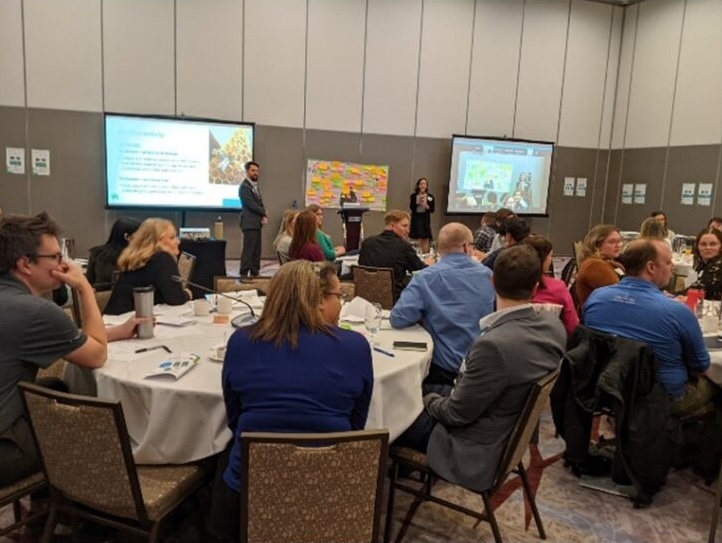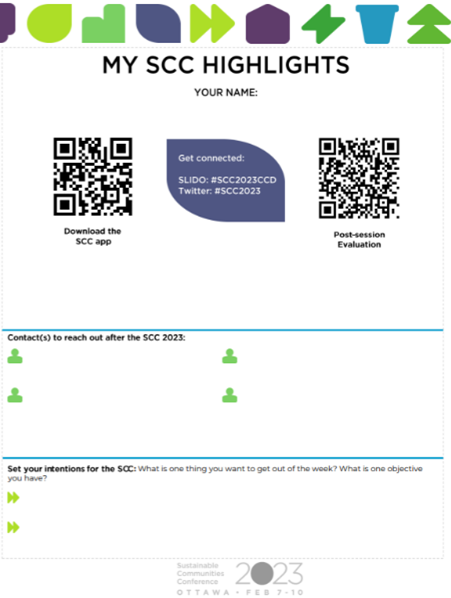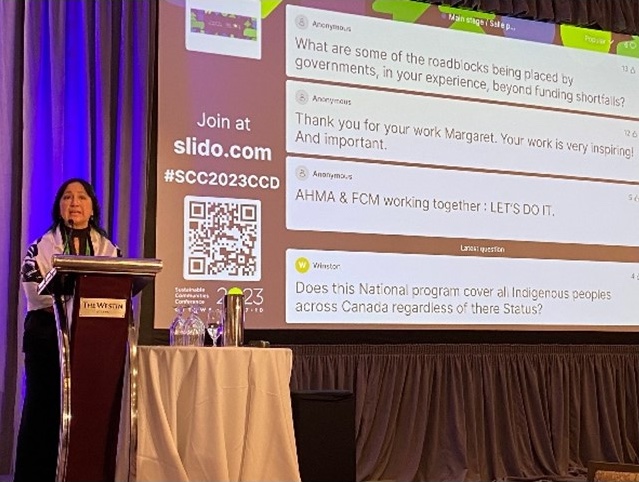Oct 2, 2023

Large industry conferences can be a challenging venue to craft a learner-centered design. They are, in nature, structured agendas with a commonly accepted approach and style – keynote addresses, panel discussions, and large passive audiences. With a desire to advance application of knowledge and reflection on conference learnings, we attempted to shake up our large event norm with a few small and hopefully impactful invitations and decisions.
With a return to in-person programming in 2023, after a near 5-year hiatus, the decision was made to initiate a hybrid conference for our biannual Sustainable Communities gathering. The last in person event happened in 2018 with two smaller virtual gatherings over the pandemic in 2020 and 2021. Our hope was to combine the past in person success with the learnings and experience of running successful virtual events over the past few years.
Over 530 municipal staff, elected officials and sustainability practitioners gathered (online and in person) to explore key trends in building climate-ready communities, discovering tools and processes for sustainable communities, and advocating for change at the local level. We opted for all keynote addresses, main stage plenaries and workshops to be delivered to both a virtual and in-person audience.
Switching from in-person, to virtual, then to hybrid over the years, we learned a lot. Here are some tips and key recommendations that we’d like to offer if you are planning a hybrid conference.

- Plan for hybrid capacity: Hybrid conferences may double your staff capacity needs in planning and executing the event. The best hybrid sessions are those planned and staffed for hybrid engagement. It takes work to engage your virtual audience – in some respects they’ve been trained to be passive delegates. We staffed each session to expressly engage with your virtual audience.
- Make time for learner engagement: Design for it and offer choice about how delegates will engage with the content presented. Ensure your achievement-based objectives speak to and meet your audience needs. This year, we designed a bilingual conference booklet (virtual and printed format) to guide and foster our participants’ learning throughout the event. At several points throughout the agenda, delegates were invited to reflect on the conference discussions, using designated spaces in their booklet. This offered a learning tool during the conference as well as a support tool after the conference.
- Use a template for the session designs: If you have a model that works, use it. Our most successful workshops this year were those that followed our template design, which included a detailed run-of show. This offered presenters helpful notes for their planning, as well as a step-by-steps outline to ensure a learning-centered approach. Yup, this ensured we had interactive presentations.
- Use tools to engage audiences equally across platforms. Whether present in person or virtually, all delegates were seen and invited in throughout the day. We used Slido to streamline panels and keynote questions and we are big fans of sticky notes and (Miro) boards! Whether virtual or real sticky notes, delegates were invited to move around, discuss and reflect on the questions being asked by other delegates.

Hybrid conferences have arrived, and they are likely here to stay. Detailed planning can help make the experience more engaging for all. After three full days of learning and mingling, it warmed our hearts to see so many participants sticking around in the main conference room and online after the closing ceremony. We (almost) had to kick some of them out! Now that’s a sign of meaningful engagement.
What do you do to ensure your conference or large gathering is learning-centered?
Lindsay Telfer is a Manager of Capacity Development at the Federation of Canadian Municipalities’ Green Municipal Fund (GMF) and was the lead on GMF’s Sustainable Communities Conference 2023, Canada’s leading event for municipal sustainability changemakers and champions.
Anne-Charlotte Olivier is a Project Officer of Capacity Development at GMF and supported the program design and overall conference coordination.
You may be interested in these resources:



